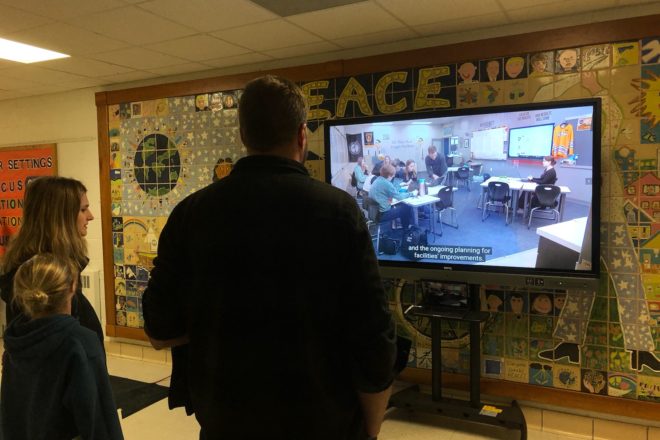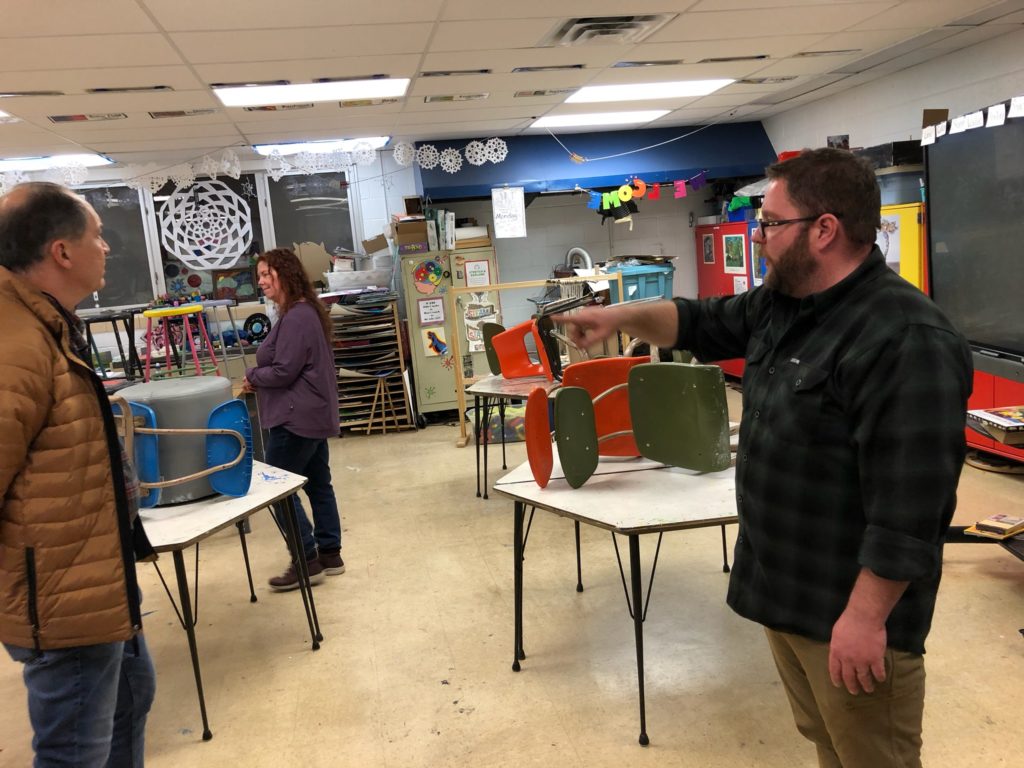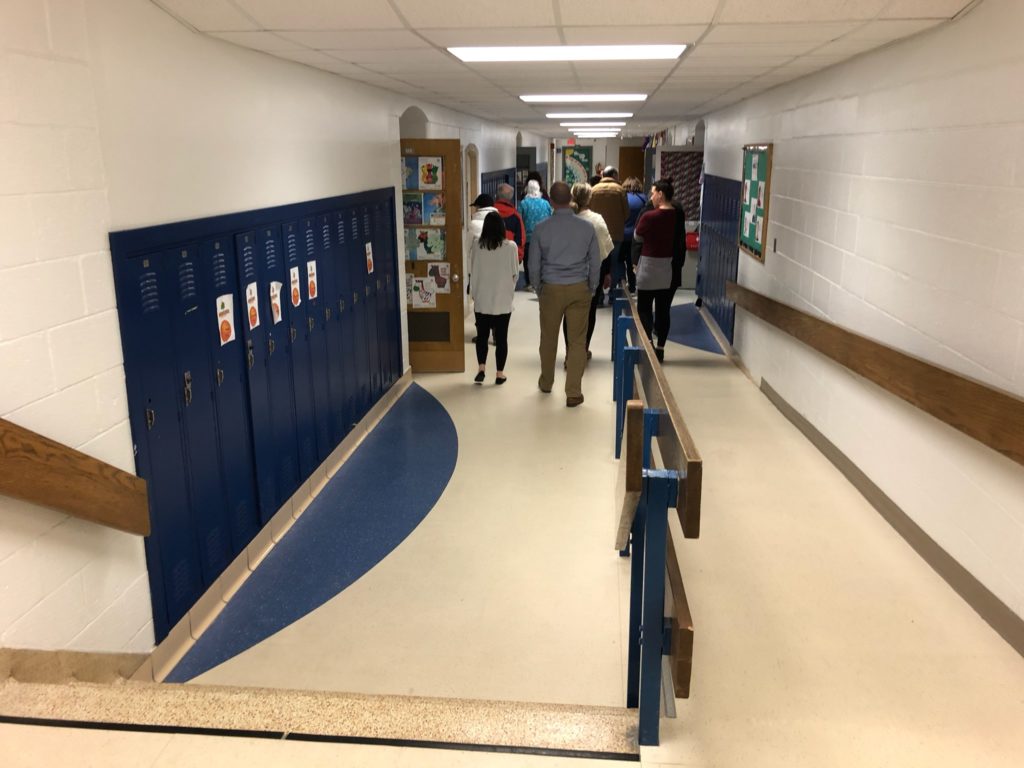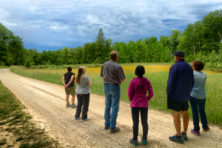Tours Reveal Gibraltar School Building Flaws
- Share
- Tweet
- Pin
- Share

Touring the Gibraltar Area Schools creates a better understanding of the problems in the heart of the buildings that are prompting the district to ask voters to pass a $29.8 million building referendum during the April 4 election.
“You get to see the doldrums of the buildings,” said Superintendent Brett Stousland to approximately one dozen voters before turning them over to district maintenance chief Eric Warner during a March 9 informational tour of the campus.
As he walked, Warner pointed out the different ramps and elevation changes in the hallways, noting that most are too steep and some are too narrow to comply with Americans with Disabilities Act rules.
He said almost all of the floor tile in the 1950s and 1930s middle-school portions of the building has asbestos in the mastic (glue). The asbestos does not pose a danger – until the moment it’s disturbed.
Likewise, the middle school gym – the original 1930s high school gym – has asbestos ceiling tile. Asbestos-wrapped galvanized and steel piping is visible in many classrooms, all of the lower-level maintenance and boiler rooms, and the gym-basement locker rooms, which have become storage space for everything from chairs to drama props.
“They put it in everything,” Warner said of the 20th-century use of asbestos. He said pipes in classrooms are wrapped, and currently the asbestos is contained and not friable.
Before the tour, Stousland said the campus also has two major security issues.

First, the buildings are not set up with fire doors or other features that can close off, or compartmentalize, several sections to prevent an intruder, or fire, from moving easily from place to place.
Second, most classrooms have only one way in and one way out: single doorways that generally have widths that meet federal wheelchair-accessibility codes.
Warner led the tour group downstairs to several cramped rooms, such as the 15-chair driver’s education classroom and a similarly sized art room that has no windows and is brightened only by student art on the block walls. One room has a divider that separates a high school class from elementary school students who work with specialists.
Warner, who has been at the school for almost 11 years, showed the visitors several places where there has been water damage. One classroom has windows at exactly ground level, and each spring, water comes flooding in. He showed a cafeteria wall that’s cracking and bowing inward. He also showed where a great deal of tile damage has occurred due to old pipes and antiquated equipment in the cafeteria.
In one hallway – bordering the portion of one section that would be torn down if the referendum passes, and the cafeteria that would be renovated – he showed where a roof drain pipe inside an interior wall broke one year. During that incident, the water dug out a wide, six-foot-deep void under the school before finally flooding the hallway.
Other flooding has occurred due to pipe breaks, such as a hot-water pipe that once leaked an estimated 300 gallons per day for an undetermined span of time before finally heating up a concrete floor and bubbling up into a room, he said. Some classrooms that once had hot water to sinks now have only cold water because the crew was unable to locate, access or fix the break.
Finally, Warner took the tour group into the boiler room, again showing the aging, asbestos-wrapped piping and a dark doorway that once served as the coal receiving and storage area.
Off one corner of the boiler room, Warner showed the group a gray, metal machine that protrudes through the floor. It’s a piece of machinery that’s peculiar to the Gibraltar district: a sewage-removal pump. Every morning, Warner or a crew member must move a lever to eject the sewage from the school.

Referendum Would Correct 90% of the Building Issues
The district led another tour March 15 and is visiting town and village boards in northern Door County to talk about the referendum that will be on the April 4 ballot.
Information about the referendum is also available on the district’s website, gibraltar.k12.wi.us. That information includes a video compiled for free by the regional office of education, CESA 7.
In that video, teachers talked about the shortcomings of their classrooms, and board member Don Helm noted that passage of the referendum would improve the campus to “a state where it’s not so problematic and more maintenance free.”
Stousland said that if voters approve the referendum, they will correct 90% of the interconnected buildings’ issues. A new central addition would put almost all of the school complex at the same elevation, correct security issues, create a new community and commons area, replace the antiquated infrastructure and gym, and create an expanded cafeteria. Warner said the cafeteria is so small now that the district has student lunch breaks staggered from 10:30 am until 1:30 pm.
The Impact for Taxpayers
This winter, financial consultants from Baird told the district that the tax increase for property owners will be slightly less than when the school board approved going for the referendum.
Due to some debt down payment and major property-value increases, the district’s mill rate fell from $3.42 per $1,000 of taxable value in 2021-22 to $2.98 in 2022-23. If the referendum passes, the Baird consultants project the 2023-24 tax rate to increase to $3.17 for 2023-24 and stay there for at least the following two years. They assumed annual growth of 5% in 2023, 4% in 2024, 3% in 2025 and 0% thereafter.
Stousland said taxpayers who own $200,000 properties would see an estimated $38 increase on their tax bills ($3.17 per month). The predicted rate increase for owners of $300,000 properties would go up by about $57 per year.
Election Is During Spring Break, So Vote Early
If voters approve the project, the district – with staff and community members’ input – can spend the rest of 2023 fine-tuning the design while bond money builds some interest. If the referendum fails, the state would not allow another one until spring 2024.
Election Day falls during Gibraltar’s spring break, so Stousland encourages voters to request absentee ballots by the March 30 deadline or opt for early in-person voting March 21-31.
He said most of the project would happen in phases between 2024 and 2026 and emphasized that the board does not want students to be displaced into outdoor, portable classrooms as they were during a 2018 project.



